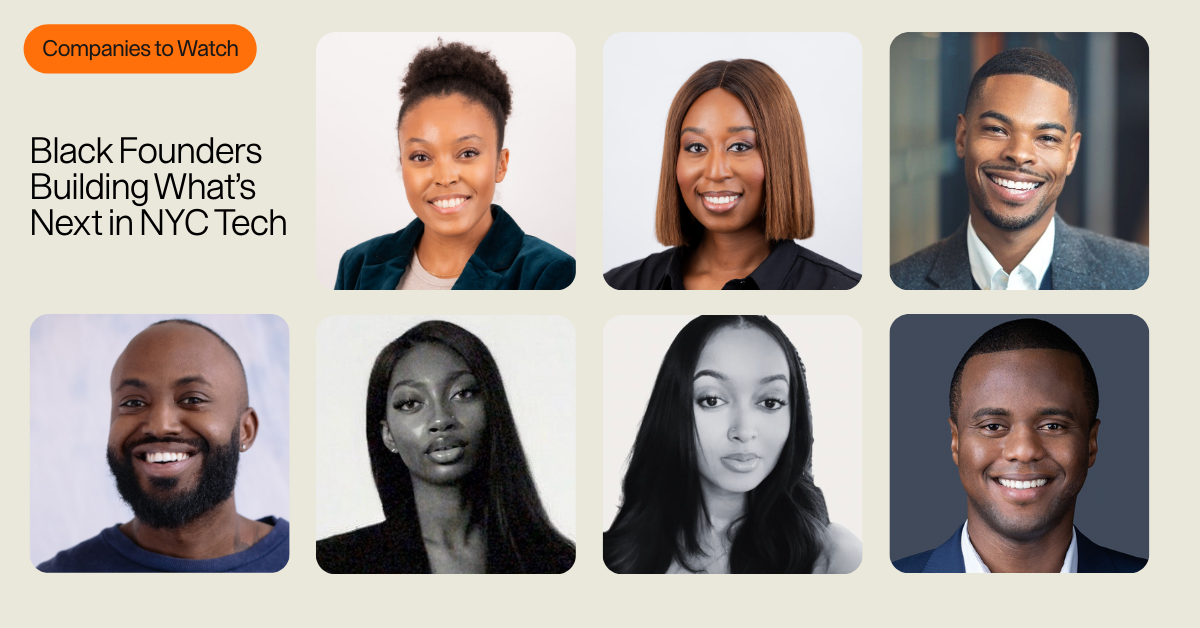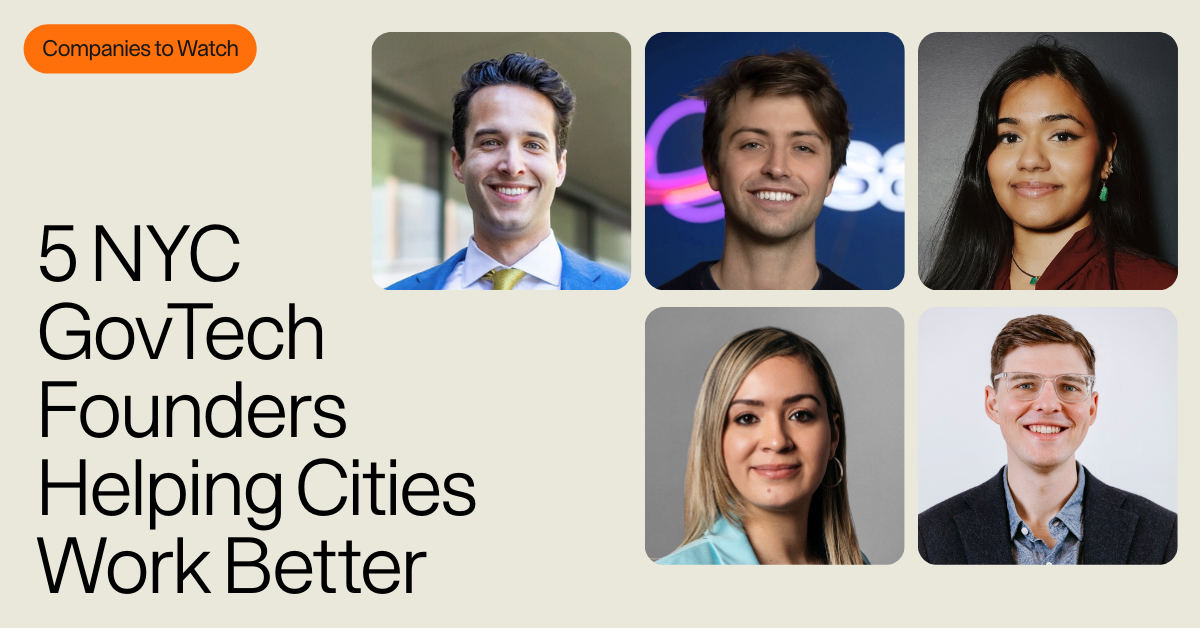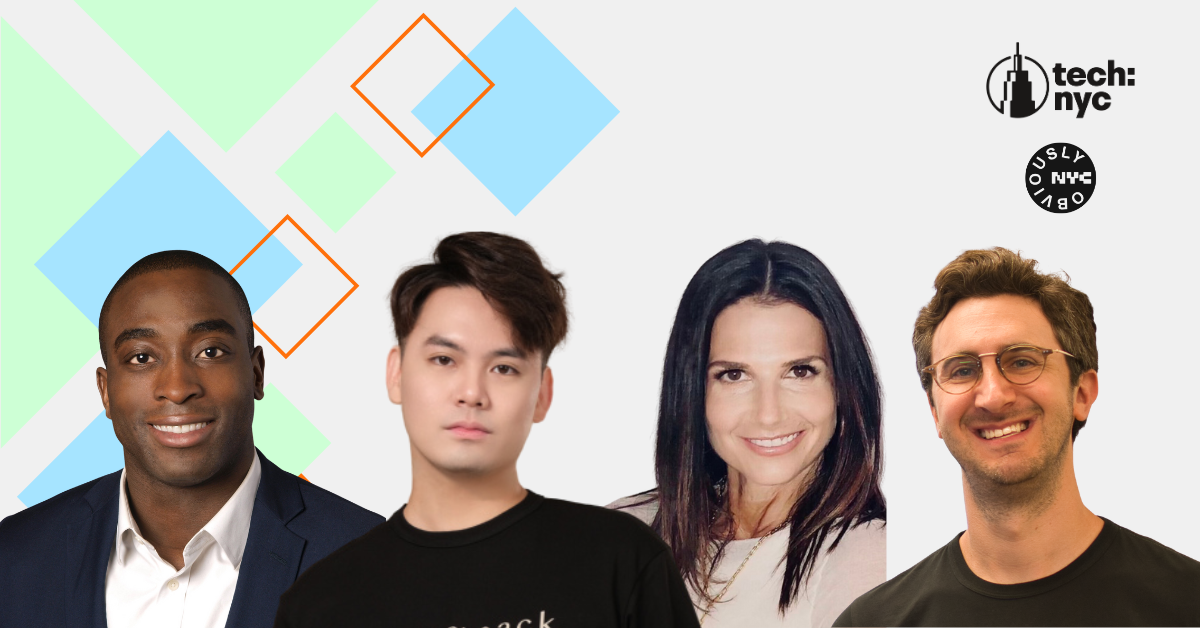Companies to Watch: New York Founders Harnessing AI for Social Impact
It’s a foregone conclusion that 2023 will be defined by the boom in AI — companies across all industries have jumped to integrate AI tools into their products. It’s moving so quickly that, like industry leaders, public officials at every level of government are having deep debates about how to harness AI’s benefits while mitigating against its harms.
New York is driving much of that discussion, and for good reason: It’s home to some of this year’s best-funded AI startups, nation-leading action plans for government use of AI, and large-scale AI research initiatives. It’s also an evolving hub of new AI jobs.
With AI’s applications ever-expanding, the next phase of growth will prioritize the ways it can create benefits and improve the lives of everyday people. To frame what’s next, we spoke to a group of founders building in the space — they told us about their startups and why New York is the place to bring their tools to scale.
For this month’s Companies to Watch, meet some of the NYC startups harnessing AI for social impact:
SUNRISE AI
What does your company do?
Sunrise AI co-founder and CEO Deepak Shrivastava: Sunrise AI provides AI powered credit insights into businesses and individuals. We leverage artificial intelligence to analyze vast amounts of user-consented open banking data and other alternative sources, enabling us to provide more accurate, fair, and inclusive credit scores. Our mission is to open up financial opportunities for those that have been underserved or excluded by traditional credit scoring systems.
A question we love to ask every founder: why New York?
DS: It’s the capital of the universe. I’m one of those born and raised snobby New Yorkers that knows New York is the best city in the world. The attitude and grit of the city are incomparable. It’s the perfect place to build a business that’s resilient, scrappy, and unafraid to take on the world. The diversity and dynamism of New York provide an unparalleled backdrop for innovation. Plus, the energy of this city is contagious – it keeps us motivated and hungry for success every day.
Is the traditional credit scoring system in the US broken? How are you using AI to open up more financial opportunities for customers?
DS: The traditional credit scoring system has extreme limitations, especially when it comes to assessing individuals with thin or no credit files. We believe it's inexcusably incomplete. AI is our tool to bridge the gaps. We use AI to analyze non-traditional and more relevant data sources, like an individual’s online and offline banking history, to create a more comprehensive view of a person's financial health. By doing so, we help people who were previously invisible to the traditional system access credit, financial, and housing opportunities.
What use cases are you finding the most traction with so far?
DS: Our traction has been significant in the rental and housing market. We’ve been working with property owners and tenants – both benefiting from our AI-driven screening solutions. This traction informs our product roadmap for 2024, where we plan to deepen our presence not only within real estate, but also expand into tangential sectors like consumer and business lending, auto finance, and student loans.
Amidst all the hype around AI, what about the technology still isn’t getting enough attention?
DS: While AI has made significant strides in many areas, ethical considerations, transparency, and accountability in AI systems still need more attention. Internally, we established a Responsible AI Advisory Board to help us ensure that our AI model development and governance processes are fair and unbiased.
Okay, some rapid-fire questions. First: where do you get your favorite pizza slice?
DS: I’m a proud Queens native, so I have to put everyone on to Singas Famous Pizza, originally from Elmhurst. It’s deep into pizza lore, strictly for the genuine pie aficionados. They have a distinct take: a greek-style pizza on a personal pita. It’s what I crave any time I’m away from New York for more than three days.
What’s the best place in New York for a coffee or lunch meeting?
DS: While I’m not the biggest fan of midtown, its central location is optimal. That being said, my favorite lunch meetings have occurred outdoors, specifically at a plaza on 41st Street between 6th Ave and Broadway, right outside the Wework I camp out of occasionally. The key component, though: Make sure to grab the Jamaican chicken curry plate with rice and peas from the Caribbean King food truck across the street. Order an extra side of the sweet plantains and thank me later.
What’s one piece of advice — that you shared or was shared with you — on building a startup from the ground up in NYC?
DS: Embrace the diversity, energy, and, most importantly, the 'centrality' of the city. Manhattan, especially, is a unique place. Nowhere else in the world could you have a dozen face-to-face conversations in a day and push your business forward that swiftly. In any other place, it would take at least a month to connect with that many folks. And all that happens on one little island. It’s absolutely incredible.
The advice I'd pass on is to tap into the incredible networking opportunities here. New York is like a microcosm of the world, and every corner of the globe is represented in this city. So, don't hesitate to make those connections, attend events, and leverage the city's unique ecosystem. It's a place where serendipitous encounters can lead to groundbreaking partnerships and opportunities you won't find anywhere else.
Besides your own, what’s another early-stage startup in New York you think more people should know about?
DS: Datapeople, founded by my old friend and colleague Amit Bhatia. They’re very much aligned with some of our same social impact drivers – their products enable companies to make hiring practices more fair and equitable for candidates.
PACES
What does your company do?
Paces co-founder and CEO James McWalter: Paces is software to help more climate positive projects like solar get built. We do this with better siting and due diligence data insights.
A question we love to ask every founder: why New York?
JM: I’m from Ireland originally, but have always loved New York. I lived here from 2012 to 2015 and then left to travel, but visas made it difficult to return, so I spent five years in Mexico working through my green card process to move back to NYC. I moved back in 2021 and have loved every minute. This is home and it’s the place that gives me the most energy.
What types of energy projects are you working on? Is there demand for a certain project type in NYC?
JM: Paces is software to enable the siting and due diligence of any climate positive project. Our early users are mostly solar developers, and New York is our best market. In upstate New York, 20-50 acre community solar projects are most common, while in NYC, it’s mostly rooftop solar and battery storage.
In a place like NYC, development can be a slow, bureaucratic process period — much less for green retrofits or upgrades where the government may lag behind industry innovations. What parts of the process slow a solution like Paces down the most?
JM: The two things that slow down climate positive development is connecting to the grid and local permitting requirements. Paces directly helps project developers to identify and avoid building in places that are more difficult to permit.
We recently launched an AI product for local permitting across New York State and have identified the specific jurisdictions that have the most pro-solar zoning codes. We also work with utilities to find the parts of the grid where projects can be connected most cost effectively. Developers are using our AI insights to build even more projects.
If you got a meeting with city and/or state leaders, how would you advise them to harness the benefits of AI to accelerate renewable development?
JM: New York has aggressive 2030 renewable energy goals. We developed an AI-based analysis of all one thousand New York jurisdictions and found that it is currently impossible to reach those goals with local permitting and grid capacity restrictions. There are places across the state where the grid has capacity, but most of those places have local anti-solar laws. So there is a real disconnect in what state lawmakers are targeting and what is possible on the ground. State legislators need to look at ways to encourage local communities to change legislation to be more pro-solar. We will share our insights with any public entity who is trying to solve this problem.
Okay, some rapid-fire questions. First: where do you get your favorite pizza slice?
JM: Little Italy Pizza, the Bedford Avenue location.
What’s the best place in New York for a coffee or lunch meeting?
JM: Partners Coffee in Williamsburg.
What’s one piece of advice — that you shared or was shared with you — on building a startup from the ground up in NYC?
JM: Be careful to attend high-value meetups! There are unlimited ways to meet other founders or early startup teams, but I think many are a distraction from the focus needed to get a startup from 0-1. Rather, find where customers congregate and spend time there. NYC has such an amazing cross spectrum of different industries, the opportunity to meet potential customers in person is a real differentiator compared to other cities.
Besides your own, what’s another early-stage startup in New York you think more people should know about?
JM: NineDot Energy is a battery storage developer with a unique, technology-driven approach to working in NYC (and also a Paces customer!). And Cella is an awesome carbon mineralization startup founded by a really brilliant scientist.
JONA
What does your company do?
Jona founder and CEO Leo Grady: Jona is a technology company using large language models to reveal the relationship between the microbiome and personal health. Our AI can input a person’s microbiome composition and, by having the AI read the entirety of the scientific and clinical literature, both interpret the health implications of the person’s microbiome and also provide guidance on the foods, lifestyle modifications and medications that can improve the person’s microbiome and health.
We believe that rapid advances in microbiome science and the use of generative AI to summarize and interpret complex testing have created a new opportunity to serve the 60-70 million Americans suffering with gut health issues. Although we have been focusing on gut health, our combination of deep microbiome sequencing and large language models also allows Jona to serve individuals focused on fitness, longevity, obesity, autoimmune conditions, metabolic disease, mental health, Parkinson's, liver disease and more.
A question we love to ask every founder: why New York?
LG: New York is the world’s leading center of health technology. New York has an incredible density of world-class hospitals, care models, an extremely diverse population, and is also leading in wellness and longevity. There is a strong venture capital infrastructure, exceptional universities, an amazing talent pool, and close proximity to the leaders in pharma, biotech, and media. Not to mention, NYC is an incredible city to live in. Jona could only be in New York.
You’ve called the microbiome not like the heart or kidney, but an “organ of data.” Can you expand on that — why is AI the right tool to unlock that organ’s health?
LG: The microbiome functions in many ways like an organ in the sense that it underpins so much of your health – and a sick or damaged microbiome can lead to serious health problems. If you were to collect all the microbes in your body together, that collection would weigh about five pounds, which is more than your brain (about three pounds). However, we can’t take an MRI of the microbiome, see the microbiome, or study the microbiome in the same way that we can study other organs because it’s so distributed. The only way we can interact with the microbiome as a whole – as an organ – is by building a data platform for the microbiome to enable this interaction.
Despite all the incredible science on the microbiome – there are more than 2,000 new papers published on the topic every month in PubMed – it has been very difficult to use an understanding of the microbiome to improve health. All the bacteria, the fungus. and the viruses can impact your health in different ways depending on the different strains and the overall ecosystem in your gut. There is even more complexity because the microbiome changes over time and can be steered through a variety of actions.
A key superpower of AI is to synthesize complexity into understanding, to enable interrogation of complex data, and to guide effective action even in the presence of significant complexity.
Let’s take a step back: Before founding Jona, as the CEO of Paige, you were leading the first-ever company to receive FDA approval for an AI product in pathology. Are public health agencies more fully embracing the power of AI now?
LG: FDA approval for an AI product is a high bar. Although Paige has continued to expand AI offerings and work with the pathology field to both digitize and embrace AI, to my knowledge no other AI companies have managed to achieve FDA approval for an AI system in pathology. That said, many public health agencies recognize the potential of AI in various aspects of healthcare, including disease detection, diagnostics, predictive modeling, and personalized medicine.
My ambition for Jona is to provide the technology, data, and AI that enables doctors to elevate the microbiome to become a central part of patient care. Elevating the microbiome to this central role will involve building multiple FDA-approved AI systems in microbiome medicine and I’m confident that, just as we did with Paige, Jona will lead this field.
When it comes to health data, privacy standards are, of course, paramount. How should practitioners in the health space balance the use of LLMs with the values of data privacy?
LG: Maintaining ethical standards and ensuring trust is crucial in healthcare. However, both privacy and security can be maintained through HIPAA/GDPR compliance and additional security certifications such as HITRUST, SOC 2, ISO 27001 and FEDRAMP. We strongly value privacy and security at Jona, maintain strict access controls, and will never share personal health information outside of Jona unless directed to by the individual (or required by law). Any new product development, using AI or otherwise, must be performed strictly on de-identified and aggregated data and any research done under supervision of an Institutional Review Board.
How much of the healthcare industry has picked up on the benefits of AI tools? Where across the industry do you think there’s still room for more implementation?
LG: AI is more prevalent today in healthcare than many people realize. The area of medicine that has most significantly embraced AI is in radiology and other visual medical disciplines such as pathology and ophthalmology. However, AI is also present in a variety of administrative and back office applications that can enhance efficiency within a provider environment.
Okay, some rapid-fire questions. First: where do you get your favorite pizza slice?
LG: Grimaldi’s.
What’s the best place in New York for a coffee or lunch meeting?
LG: So many! I’ve been liking The Well lately.
What’s one piece of advice — that you shared or was shared with you — on building a startup from the ground up in NYC?
LG: Aim big and do something you’re passionate about. Take advantage of the tech community in NYC and all the incredible resources here in terms of people, hospitals, capital, and media.
Besides your own, what’s another early-stage startup in New York you think more people should know about?
LG: Besides Paige, Network.bio is a new NYC-based health tech company in a very interesting market.














